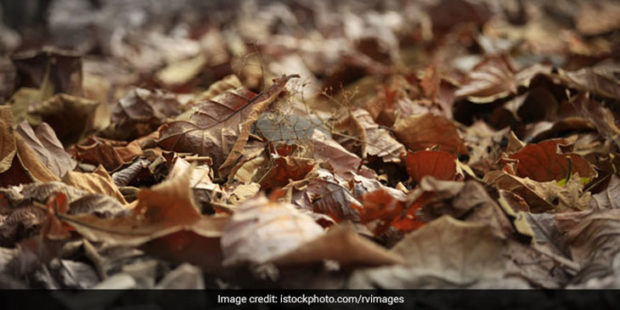
Some tree leaves will fall 3-6 days in advance by end of century due to climate change
PTI, Nov 28, 2020, 10:26 AM IST

Berlin: A large-scale study of European trees suggests that the leaves of trees between the tropics and the polar regions of the Earth will start to fall in advance by three to six days by the end of the 21st century rather than lengthening by one to three weeks as current models have predicted.
The scientists, including those from the University of Munich (LMU) in Germany, said earlier studies had predicted that the shedding of leaves from these temperate trees will get later under the ongoing climate crisis.
They said early observations also supported this idea since warming caused leaves to stay on the trees later over recent decades, driving increased growing season length that could help to slow the rate of climate change.
However, the current study, published in the journal ‘Science’, showed that this trend might be reversed as increasing photosynthetic productivity begins to drive earlier autumn leaf fall, or senescence.
According to the researchers, the results build on growing evidence that plant growth is limited by the ability of tree tissues to use and store carbon. While changes in the growing-season lengths of temperate trees greatly affect global carbon balance, they said future growing-season trajectories remain highly uncertain since the environmental drivers of autumn leaf senescence are poorly understood.
Autumn leaf-shedding at the end of the growing season in temperate regions is an adaptation to stressors, such as freezing temperatures, the scientists explained. While a common assumption is that alleviating a warmer climate could allow leaves to persist longer and consume more atmospheric carbon, the researchers said the role of photosynthesis in governing the timing of leaf senescence has not been widely tested in trees.
In the current study, the scientists used long-term observations from dominant Central European tree species from 1948 to 2015, and experiments designed to modify carbon uptake by trees, to evaluate related impacts on senescence.
“Accounting for this effect improved the accuracy of senescence predictions by 27 to 42 per cent and reversed future predictions from a previously expected 2- to 3-week delay over the rest of the century to an advance of three to six days,” the scientists wrote in the study.
The data revealed that increased growing-season productivity in spring and summer due to elevated carbon dioxide, temperature, or light levels can lead to earlier — not later — leaf senescence.
This is likely because roots and wood cease to use or store leaf-captured carbon at a point, making leaves costly to keep, the study noted.
The model built by the researchers forecasted the possibility of slight advances, not delays, in autumn leaf-dropping dates over the rest of the century.
According to the scientists, the results “substantially lower our expectations of the extent to which longer growing seasons will increase seasonal carbon uptake in forests”.
However, they said the universality of this pattern in other forest types remains unknown.
The researchers believe it is important to implement such growing-season length constraints in other models which do not consider these dynamics. PTI
A large-scale study of European trees suggests that the leaves of trees between the tropics and the polar regions of the Earth will start to fall in advance by three to six days by the end of the 21st century rather than lengthening by one to three weeks as current models have predicted.
The scientists, including those from the University of Munich (LMU) in Germany, said earlier studies had predicted that the shedding of leaves from these temperate trees will get later under the ongoing climate crisis.
They said early observations also supported this idea since warming caused leaves to stay on the trees later over recent decades, driving increased growing season length that could help to slow the rate of climate change.
However, the current study, published in the journal Science, showed that this trend might be reversed as increasing photosynthetic productivity begins to drive earlier autumn leaf fall, or senescence.
According to the researchers, the results build on growing evidence that plant growth is limited by the ability of tree tissues to use and store carbon.
While changes in the growing-season lengths of temperate trees greatly affect global carbon balance, they said future growing-season trajectories remain highly uncertain since the environmental drivers of autumn leaf senescence are poorly understood.
Autumn leaf-shedding at the end of the growing season in temperate regions is an adaptation to stressors, such as freezing temperatures, the scientists explained.
While a common assumption is that alleviating a warmer climate could allow leaves to persist longer and consume more atmospheric carbon, the researchers said the role of photosynthesis in governing the timing of leaf senescence has not been widely tested in trees.
In the current study, the scientists used long-term observations from dominant Central European tree species from 1948 to 2015, and experiments designed to modify carbon uptake by trees, to evaluate related impacts on senescence.
“Accounting for this effect improved the accuracy of senescence predictions by 27 to 42 per cent and reversed future predictions from a previously expected 2- to 3-week delay over the rest of the century to an advance of three to six days,” the scientists wrote in the study.
The data revealed that increased growing-season productivity in spring and summer due to elevated carbon dioxide, temperature, or light levels can lead to earlier — not later — leaf senescence. This is likely because roots and wood cease to use or store leaf-captured carbon at a point, making leaves costly to keep, the study noted.
The model built by the researchers forecasted the possibility of slight advances, not delays, in autumn leaf-dropping dates over the rest of the century.
According to the scientists, the results “substantially lower our expectations of the extent to which longer growing seasons will increase seasonal carbon uptake in forests”.
However, they said the universality of this pattern in other forest types remains unknown.
The researchers believe it is important to implement such growing-season length constraints in other models which do not consider these dynamics.
Udayavani is now on Telegram. Click here to join our channel and stay updated with the latest news.
Top News
Related Articles More

World Malaria Day: WHO calls for equitable health access

What role does genetics play in breast cancer? How can genetic testing help with early breast cancer diagnosis?

Father’s diet can affect anxiety in sons, metabolism in daughters: Study in mice finds

Low back pain, depression, headaches main causes of poor health: Study

Surgical options for Parkinson’s disease
MUST WATCH
Latest Additions

Lok Sabha elections 2024: EC takes cognisance of MCC violation by Modi, Rahul; seeks response by April 29

Polali: Case filed against a man for molesting minor

Kotak Mahindra Bank shares tank 13%; mcap erodes by Rs 37,721 crore post RBI action

Lok Sabha polls 2024: Sunita Kejriwal likely to join AAP’s campaign in Delhi, will hold roadshows this weekend

NCBC seeks clarification from Karnataka chief secretary on reservation policy for Muslims






















